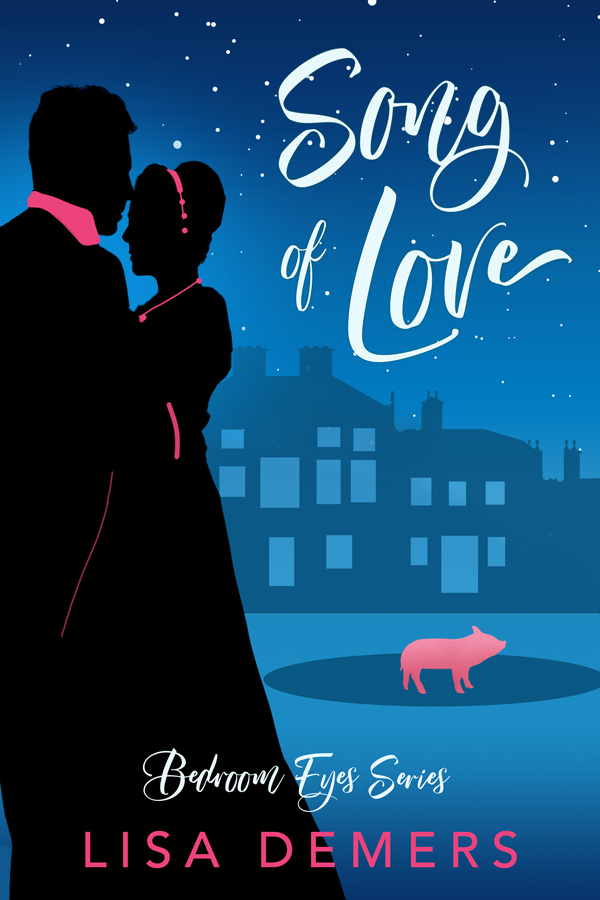Song of Love
Song of Love
Bedroom Eyes Series
Sometimes heroines are beautiful, smart, and tackle the world. Sometimes, they see the world with a unique pair of eyes. They’re neither bold, clever, nor assertive, but find their own path in life. One that involves piglets.
Augusta Rudhall loves her home, playing the piano, and the yearly litter of piglets. She doesn’t understand people. They never say what they mean, often using sweet words when their intention is to be cruel and are unfaithful friends. She has difficulty figuring out how anyone feels. Yet, she has been told she must marry despite never dreaming of that state.
Nate Fairchild loves bawdy women and bawdy songs. Mostly, he loves the music of ordinary folk and has spent years in London collecting songs from the common people. During a stop at a brothel, he runs into a girl in disguise, discovering ‘Gus’ has inexplicably followed her father there. He hurries her out.
At a ball the next day, he finds Gus weeping in the garden, having been hurt by cruel words. But offering her his handkerchief and a pat on the back ends up compromising her. Both their lives are uprooted, as neither knows anything about the other. Can two more incompatible people find love?
In This Series...
- Gambling on Love
- Inventing Love
- Uncovering Love
- Hidden Love
Slumped, her behind cold on the stone bench, Augusta startled and brought her arms up when Margaret’s icy blue dress came into view.
“My garden is bigger than a ballroom and yet I still find you being a wallflower.”
Her hostess sat next to her. The beauty had often mentioned finding Gus on the edges of a room, only observing the participants. She had shared the term ‘swans and swains’ to describe the women and men talking, dancing, and flirting.
A rush of warmth for her friend engulfed Augusta as she lowered her arms and straightened. She opened her mouth, but only managed a sigh.
“That bad? I’m worried something has upset you. That bothers me; you’re so honest. I fret others will prick and poke and harm you.”
“Why did you invite me to your débutante tea a second time? Was it because I’m tiny and you see me as a little girl? A strange woman thought I shouldn’t even be here.”
“I think you’re a singular person and admire you,” Margaret answered gently, touching her hand. “I rarely make friends with any of the dozens of young women who attend my teas. Their mothers push them to come so they can boast about knowing a Duke’s daughter. But last year, you asked me if I liked pigs and apples the moment we met. You’re refreshing and honest in a place where everyone is deceptive.” Her lips parted as a smile grew.
“I don’t understand why someone would want to be deceptive. And I simply don’t understand people most of the time. I listen to their words and believe what they say is what they mean.” Gus breathed deeply then fidgeted, the cold stone under her bottom was uncomfortable. “Ophelia told me to notice how they’re feeling, but I have a hard time figuring feelings out.” Margaret didn’t interrupt; she started to stroke Gus’ hand which allowed her thoughts to germinate.
“If people shout, then I think they’re angry. If they cry, then I think they’re sad. When their face squishes up like this…,” she brought her brows together and pursed her lips dramatically, “I think they are worried. But beyond that, I can’t tell. Often, I’m wrong.”
Margaret’s head swung side to side. “Never let anyone tell you you’re simple. You’re a deeply emotional creature whose range of emotions exceeds the petty, selfish desires of most of the ton.”
“I’ve been hurt a lot, so I often hide my feelings.” She squeezed her friend’s hand.
“I’m sorry that others can’t appreciate you in your glory. But I can help you navigate your season.” Her friend’s eyes sparkled.
“How so?” Margaret’s dark eyes invited though her smile made Augusta’s chest tighten. What is she going to ask me to do?
“I’m sure you had lessons in deportment and addressing others, and how to make conversation?” Augusta nodded. “Then stick to safe topics, the weather, or ask how people fare. Avoid gossip since it’s based on opinion. Most people feel strongly about one side or the other.”
“I never considered using Mrs. Milsent’s deportment lessons!” Gus straightened.
“And observe people’s faces for clues about how they feel. How do you think I feel now?”
“You look happy.”
“Right, but why?” Margaret pressed.
“Because I can see your teeth when you smile.”
“What about this?” Her friend’s face changed.
“Sad, because you’re frowning and your eyebrows are crinkly.” Augusta pointed to her own. Despite having other guests, Margaret took her through a short list of emotions and how they appeared on people’s faces.
A few she had trouble with, surprise and fear were too similar. She only noted the raised eyebrows and couldn’t discern the understated, but subtle clues her friend attempted to mimic, like surprise involving an open mouth while fear might involve clenched teeth. And she couldn’t tell the difference between disapproval and worry at all. They both involved a tight mouth somehow, but were too subtle to distinguish.
Margaret insisted, “in that case, the words people use will alert you to how they feel. There’s a big difference between someone scorning you or being worried about you.”
“I think I understand that.”
Her friend stood and held out her hands to pull Augusta to her feet. “Now! Come see the temple and have some lemonade.”


